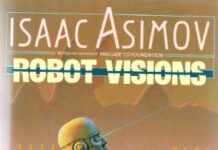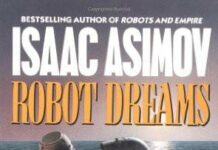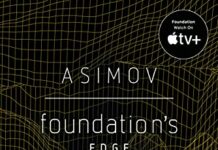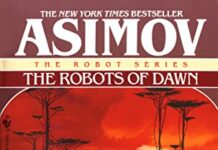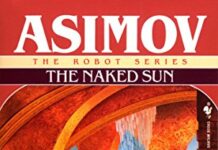
Ebook Info
- Published: 2020
- Number of pages: 256 pages
- Format: EPUB
- File Size: 0.17 MB
- Authors: Isaac Asimov
Description
A spellbinding novel set in the universe of Isaac Asimov’s classic Galactic Empire series and Foundation seriesDue to circumstances within our control . . . tomorrow will be canceled.The Eternals, the ruling class of the Future, had the power of life and death not only over every human being but over the very centuries into which they were born. Past, Present, and Future could be created or destroyed at will. You had to be special to become an Eternal. Andrew Harlan was special. Until he committed the one unforgivable sin—falling in love. Eternals weren’t supposed to have feelings. But Andrew could not deny the sensations that were struggling within him. He knew he could not keep this secret forever. And so he began to plan his escape, a plan that changed his own past . . . and threatened Eternity itself.
User’s Reviews
Reviews from Amazon users which were colected at the time this book was published on the website:
⭐My first reaction to The End of Eternity as soon as I finished the book was one of discomfort with its many flaws. I instantly ranked it as one of Asimov’s minor works for the reasons I describe below. But as I let my thoughts about the book settle down, I started enjoying it more and more, and finally concluded it is a quite important piece in Asimov’s complex universe, especially after revisiting Foundation’s Edge and finding in it a direct reference to Eternity and Eternals and how these help explain why in the Reality of the Galactic Empire, the whole universe is only inhabitted by human beings–not by chance but by careful selection made by the Eternals among the infinite possible Realities. I’m always learning more about how Asimov managed to connect all of his books in a single context, which is not a small task considering how prolific he had been. And in the particular case of EoE this is even more of an accomplishment, as the themes here are much more apart from the thematic environs of the Robot and Foundation series.Still, there are many plot holes and logic loopholes in this book that are difficult to digest. The way Asimov describes how Time is structured and can be manipulated is somehow undeveloped if not primitive, especially if compared with shorter but much more compelling stories like Heinlein’s “All You Zombies–“, Borges’s “The Garden of Forking Paths” or even PKD’s “Adjustment Team”. Those, imho, are much more interesting stories about time travel and time paradoxes, even though Asimov as well strived to enrich his story with time paradoxes. The whole concept of time manipulation, which is central to the very existence of Eternity, seemed fragile to me. Eternity appears in the beginning of the book as something monastic, just like Castalia in Hermann Hesse’s The Glass Bead Game (and Andrew Harlan becoming Twissell’s pupil reminded me of Josef Knecht befriending Father Jacobus, which initially seemed quite promising). But later on, the plot moves towards a time paradox not much different from John Connor’s sending his father Kyle Reese back in time in Terminator (a kind of paradox that is much more thrilling in Robert Heinlein’s “All You Zombies–“). The time travel rules in EoE seem not to resist a more careful logical scrutiny either, and even after lifting the veil of verisimilitude I found myself stopping and thinking: “wait a minute, this does not fit into the rest of the picture because…”Asimov’s simple and sometimes even clumsy writing style also shows in EoE. His limited and somewhat amateurish style makes this book sound very much like a low-budget sci-fi movie. For instance, the extensive use of dialog to convey details of the plot, which is only annoying in Foundation, here in EoE gets to the point of even being comical, particularly when Twissell speaks. He, who is described as gnome-like, immediately seemed to me like Mel Brooks as Yogurt in Spaceballs. All that becomes even more salient in this book because Asimov really strives to enrich Andrew Harlan’s character with a more complex personality than usual (he is, indeed, an above-average emotionally complex character to Asimov’s standards): there are many vivid descriptions of Harlan’s dreams, and even a direct quote from the Bible: Proverbs 28:1, but all that seems to miss its purpose in a loose, awkward way.The trouble is that Harlan’s inner motivations are key to make the whole plot move on, and they were not convincing to me. The incentives seemed all wrong. Although many dystopian sci-fi stories use romance to crack the rigidity of the system, here in EoE Harlan’s obsession for Noÿs is almost caricature-like. Harlan’s incentives lack weight, and that is rather disappointing because I can see how much effort Asimov has dedicated to make them credible. Even the plot twist at the end, which attempts to redeem Noÿs’s futility, is not enough to move the needle, imho.Notwithstanding all that, I remain a big Asimov fan. So even here in EoE, where things don’t seem to add up, the connection with Foundation’s Edge is more than enough to make me view the whole novel from a different, maybe more indulgent perspective. Asimov’s style is in many instances shaky and precarious, the plot may have loopholes and its logic may be flawed, but as in the case of the weakest parts of Foundation here again I end up forgiving it all in favor of the strength of Asimov’s whole, impressive corpus.
⭐What if humanity developed a system whereby it could control its own future by routinely changing history? “Eternity” is such a system outside of normal space-time, and the men who run it travel back and forth in time to make these changes. Ordinary people of the various centuries are aware of Eternity’s existence, but only to the extent of fostering intertemporal trade, and have no knowledge that history isn’t solid and unchangeable.Technician Andrew Harlan’s job is to make small changes to history (because large changes would be too unpredictable or disastrous) to steer it in directions presumably to keep mankind safe. But recently he has made a critical discovery that could destroy Eternity, but what will be the ultimate consequences?Asimov explores so many of the consequences and paradoxes of time travel, and the ending really is mind-blowing, because it involves a change in our own history, which is all I’ll say about it without revealing any spoilers. Highly recommend it!
⭐Hotshot and renegade Eternal Technician Andrew Harlan found himself manipulated by Computer Leban Twissel to train and manipulate Sheridan Cooper who stood in for Vikkor Mallansohn whose ancient diaries produced the formulas needed to maintain eternity. The Council, that seemed about as organized and infighting as a gaggle of politicians, constantly manipulating reality perhaps eliminating plagues and wars and distributing wealth more equally for the greater good, as they saw it. Because of the constant reality changes, the now does not exist in eternity. Because society does not solve problems satisfactorily, the Council constantly corrected realities. The financing and appointments of the Council was never satisfactorily explained. Cooper was to complete the circle as the dead Mallansohn with his masterful diary of theories which without Eternity could not be established. Thus, the upwhen society could not have established Eternity without the information from downwhen which could not have been made available to the upwhen which could not have been available except from downwhen. Thus, a magical time loop must be completed. Then, there were the hidden centuries which time travelling kettles could not penetrate. Apparently, mankind died out at the end of those centuries because they c ould not take over the millions and billions of galaxy worlds where they could be happy. By the time they had developed the technology to conquer space, other species had beat them to it and not want mankind in their worlds. Human evolution had ceased with the establishment of Eternity. Eternity had ruled out the disasters but the triumphs as well. Then, there was pretty girl and great sexer Noys Lambert from the closed centuries sent to destroy Eternity, thus creating happiness by allowing mankind to develop galactic travel and populate the universe with their cheery little faces. Harlan could do anything for true lust. She and Harlan are left to live happily ever after in the primitive century fornicating and producing babies… unless Cooper who preceded the happy duo, wrote his diary under the name Mallansohn sent it forward under a time seal and completed the Eternity circle again and again without their knowledge. But, of course, they would too busy to realize that eternity has just not begun yet. Unless, of course, after completing her mission, Noys allowed herself to become fat and bitchy to avoid Harland’s advances and he ended up trapped in a fool’s paranoid. But, the space travel development was just a conjecture on the part of Noys, since the ultimate realities could not be completely calculated and, without adjustment, might not end up as planned. Who knows what lurks in the hearts of man…. so to speak. Like a b horror film ending twist, we are left with an inkling the show is not over yet. There was a lot of talking. Thankfully, The End of Eternity is a brief stand-alone novel.
⭐I’d forgotten that Asimov actually learned how to write. Having most recently read his original Foundation books and I, Robot I was expecting successive scenes with one person talking to another about ideas. Instead we get a high-concept mystery thriller with a complex narrative structure. It’s almost a noir SF novel, with a hero disintegrating under pressure as convincingly as any Simenon or Highsmith central character.The Eternals, a near-monastic organization that lives outside regular time, are like the Time Lords except that instead of standing aloof they constantly tinker with alterations to the course of history. I liked that because usually these organizations set great store by preserving the “original” timeline spawned by random events. This policy of active interference proves to be a major plot point.Time travel novels always require the writer to set up some rules. It’s the nature of the genre that those rules may not hold up if you scrutinize them too closely, but at one point Asimov seems to forget his own rules anyhow. He has an alteration in Reality change some old magazines stored in Eternity (the zone outside time where the Eternals live). Yet the whole point of the novel up till now is that if a person is brought into Eternity then they are unaffected by changes to their original timeline. If that weren’t so, the Eternals themselves would be a constant risk of disappearing. The protagonist even uses this rule to protect a non-Eternal from the effects of a change in their century. So the magazines should have been brought into Eternity after the change — yet Asimov says that the pages physically alter every time a change is made outside Eternity, violating his own rule.That aside, I liked it a lot. You might find the the all-male nature of Eternity contrived and a bit dated (in The Machine Stops fifty years earlier, Forster assumed the far future would have just as many leading women as leading men) but that’s no different from the all-male college of magicians in Earthsea, say. (Although admittedly something like that makes more sense in fantasy than in SF, which we expect to abide by other rules than just the author’s.) Anyway, bear with that as Asimov is fully aware of it and we discover that he’s not propounding this as the natural and inevitable state of all human organizations.
⭐Asimov is one of SF legendary writers, having written some classic works. Unfortunately I don’t count this as among them.The End of Eternity explores time travel and resultant paradoxes and changes in Reality that can occur through manipulation of history. However this novel is at times messy and confusing. I had to read several sections over again to ensure I’d got what was going on as the custodians of Eternity step in and out of Time at various different centuries.I couldn’t help wondering at the conclusion whether the whole thing really gelled, but gave up worrying about it….
⭐Isaac Asimov is certainly one of the most reliable sci-fi authors. He infallibly provides clever plots, full of intelligent twists, scientific knowledge and unexpected reasoning. And The End of Eternity does not stain this unblemished record. For a quite short story (190 pages) it puts together an interesting proposition for time travel and discusses its obvious implications and potential paradoxes.The plot is centered around the existence of an organization, Eternity, outside regular temporal flow. This organization can access every century of human history since its creation on the 24th century (before that are the primitive centuries where temporal flow is immutable), until the 70.000th century (the hidden centuries, blocked by some kind of barrier). It also assumes an active role in shaping human history by conducting surgical modifications in its normal course (or the one with maximum probability of happening), thus creating multiple realities. Eternity is run by Eternals, mostly male humans that are subtracted from their realities in childhood to live almost as disciples of time.The End of Eternity introduces many of the most obvious time-travel paradoxes, such as one meeting with oneself, or a Bootstrap Paradox. But perhaps the most important discussion resides on the actual good of performing changes in time, even if with best intentions. Asimov, as usual, provides clear explanations of the assumptions behind his sci-fi constructs. One that I found particularly interesting is the limited impact of timeline modifications. Asimov considers that any change will wear out in a couple of centuries, and not exponentially increase its effects across human history.Of course the narrative also includes a human side, even a love story that will decisively change the course of history. And, as always, Asimov provides an unexpected finale where everything comes together quite nicely.
⭐I first read Asimov’s time-based novella in my late teens. I’d re-read the Foundation trilogy (none of the later add-ons thank goodness) several times and was looking for something new from such a great sci-fi master. The story didn’t disappoint.Over the years, the ideas behind The End of Eternity have stayed firmly imprinted in my mind – it was a slow burner, but I came to understand what a visionary work of genius it was. Recently I re-read the book and found myself awed by the brilliant simplicity of the idea behind it, and the fabulous architecture of the story.The book is perhaps an attack on utilitarianism (the greatest happiness for the greatest number), claiming that, to be our very best, humans must have room to breathe, spread out and create. The discussion of the need for or dreadful waste of resources that space exploration represents is as important and relevant now as it was in 1955 when first published.The main protagonist, Andrew Harlan, is a very special member of the human society known as Eternity. He’s a technician, responsible for tweaking history here and there to constantly improve humanity’s lot. Depending on your point of view, it’s his own human frailties that either jeopardize his hard work or threaten to put a stop to this meddling with time.The imagination is five star as is the plot construction. The quality of the actual writing doesn’t reach those dizzy heights and is clunky at times, but it’s well worth persevering with to leave you with a memory that will last for ever, or at least until the next reality change…
⭐The novel is great, but this Panther edition is over-priced (£7 for a pretty short book published in 1955 is crazy). And to add insult to injury, it is also very poorly proof-read. It feels like at least once or twice a page there is an error (including missing words, or a completely different word being chosen to the one intended) that makes you have to stop, read the sentence again and work out the error to know what was meant.
Keywords
Free Download The End of Eternity in EPUB format
The End of Eternity EPUB Free Download
Download The End of Eternity 2020 EPUB Free
The End of Eternity 2020 EPUB Free Download
Download The End of Eternity EPUB
Free Download Ebook The End of Eternity
